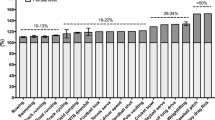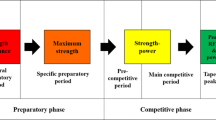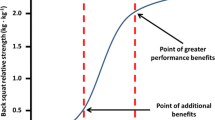Abstract
Genetic and environmental factors have long been suspected to influence on physical performance and athletic ability. Recent studies have suggested that the skeletal-muscle actin binding protein α-actinin-3 (ACTN3) gene was associated with athletic performance in Europeans. It would lead us to hypothesize that ACTN3 gene may be one of the factors that influence certain variation in muscle function, but origins and replicate tests remain to be elucidated. We analyzed ACTN3 genetic polymorphism to assess the possible role of the genotype differences (RR, RX, and XX) in elite athletic performance in a population-based case-control study in Korea. The ACTN3 gene locus was found to be no deviation from Hardy–Weinberg expectation. We observed a significant association between female sprint/power athletes (SPAs) and control (P = 0.028), that of male SPAs or all SPA samples did not. The female SPAs appeared to have a dearth of 577 XX genotype (OR 0.104, 95 % CI 0.013–0.822, P = 0.011) compared with the control with a replicating finding in the Korean population. Thus, our results imply that the sex specific ACTN3 R577X genotype may provide a significant effect on elite Korean female SPAs status, although larger sample sizes and functional studies are necessary to further elucidate these findings.
Similar content being viewed by others
References
Ahmetov II, Gavrilov DN, Astratenkova IV, Druzhevskaya AM, Malinin AV, Romanova EE, Rogozkin VA (2013) The association of ACE, ACTN3 and PPARA gene variants with strength phenotypes in middle school-age children. J Physiol Sci 63:79–85
Alfred T, Ben-Shlomo Y, Cooper R, Hardy R, Cooper C, Deary IJ, Gunnell D, Harris SE, Kumari M, Martin RM et al (2011) ACTN3 genotype, athletic status, and life course physical capability: meta-analysis of the published literature and findings from nine studies. Hum Mutat 32:1008–1018
Bouchard C, Dionne FT, Simoneau JA, Boulay MR (1992) Genetics of aerobic and anaerobic performances. Exerc Sport Sci Rev 20:27–58
Bray MS, Hagberg JM, Pérusse L, Rankinen T, Roth SM, Wolfarth B, Bouchard C (2009) The human gene map for performance and health-related fitness phenotypes: the 2006–2007 update. Med Sci Sports Exerc 41:35–73
Clarkson PM, Devaney JM, Gordish-Dressman H, Thompson PD, Hubal MJ, Urso M, Price TB, Angelopoulos TJ, Gordon PM, Moyna NM et al (2005) ACTN3 genotype is associated with increases in muscle strength in response to resistance training in women. J Appl Physiol 99:154–163
Cordain L, Gotshall RW, Eaton SB, Eaton SB 3rd (1998) Physical activity, energy expenditure and fitness: an evolutionary perspective. Int J Sports Med 19:328–335
Döring FE, Onur S, Geisen U, Boulay MR, Pérusse L, Rankinen T, Rauramaa R, Wolfahrt B, Bouchard C (2010) ACTN3 R577X and other polymorphisms are not associated with elite endurance athlete status in the Genathlete study. J Sports Sci 8:1355–1359
Druzhevskaya AM, Ahmetov II, Astratenkova IV, Rogozkin VA (2008) Association of the ACTN3 R577X polymorphism with power athlete status in Russians. Eur J Appl Physiol 103:631–634
Eynon N, Ruiz JR, Femia P, Pushkarev VP, Cieszczyk P, Maciejewska-Karlowska A, Sawczuk M, Dyatlov DA, Lekontsev EV, Kulikov LM et al (2012) The ACTN3 R577X polymorphism across three groups of elite male European athletes. PLoS ONE 7:e43132
Fiuza-Luces C, Ruiz JR, Rodríguez-Romo G, Santiago C, Gómez-Gallego F, Yvert T, Cano-Nieto A, Garatachea N, Morán M, Lucia A (2011) Are ‘endurance’ alleles ‘survival’ alleles? Insights from the ACTN3 R577X polymorphism. PLoS ONE 6:e17558
He M, Gitschier J, Zerjal T, de Knijff P, Tyler-Smith C, Xue Y (2009) Geographical affinities of the HapMap samples. PLoS ONE 4:e4684
Judson RN, Wackerhage H, Hughes A, Mavroeidi A, Barr RJ, Macdonald HM, Ratkevicius A, Reid DM, Hocking LJ (2010) The functional ACTN3 577X variant increases the risk of falling in older females: results from two large independent cohort studies. J Gerontol A Biol Sci Med Sci 66:130–135
Liu K, Muse SV (2005) PowerMarker: an integrated analysis environment for genetic marker analysis. Bioinformatics 21:2128–2129
Lucia A, Gómez-Gallego F, Santiago C, Bandrés F, Earnest C, Rabadán M, Alonso JM, Hoyos J, Córdova A, Villa G, Foster C (2006) ACTN3 genotype in professional endurance cyclists. Int J Sports Med 27:880–884
Lucia A, Oliván J, Gómez-Gallego F, Santiago C, Montil M, Foster C (2007) Citius and longius (faster and longer) with no alpha-actinin-3 in skeletal muscles? Br J Sports Med 41:616–617
MacArthur DG, North KN (2005) Genes and human elite athletic performance. Hum Genet 116:331–339
MacArthur DG, Seto JT, Raftery JM, Quinlan KG, Huttley GA, Hook JW, Lemckert FA, Kee AJ, Edwards MR, Berman Y et al (2007) Loss of ACTN3 gene function alters mouse muscle metabolism and shows evidence of positive selection in humans. Nat Genet 39:1261–1265
Mills M, Yang N, Weinberger R, Vander Woude DL, Beggs AH, Easteal S, North K (2001) Differential expression of the actin-binding proteins, alpha-actinin-2 and -3, in different species: implications for the evolution of functional redundancy. Hum Mol Genet 10:1335–1346
Niemi AK, Majamaa K (2005) Mitochondrial DNA and ACTN3 genotypes in Finnish elite endurance and sprint athletes. Eur J Hum Genet 13:965–969
North KN, Yang N, Wattanasirichaigoon D, Mills M, Easteal S, Beggs AH (1999) A common nonsense mutation results in alpha-actinin-3 deficiency in the general population. Nat Genet 21:353–354
Papadimitriou ID, Papadopoulos C, Kouvatsi A, Triantaphyllidis C (2007) The ACTN3 gene in elite Greek track and field athletes. Int J Sports Med 29:352–355
Roth SM, Walsh S, Liu D, Metter EJ, Ferrucci L, Hurley BF (2008) The ACTN3 R577X nonsense allele is under-represented in elite-level strength athletes. Eur J Hum Genet 16:391–394
Ruiz JR, Fernández del Valle M, Verde Z, Díez-Vega I, Santiago C, Yvert T, Rodríguez-Romo G, Gómez-Gallego F, Molina JJ, Lucia A (2011) ACTN3 R577X polymorphism does not influence explosive leg muscle power in elite volleyball players. Scand J Med Sci Sports 21:e34–e41
Santiago C, González-Freire M, Serratosa L, Morate FJ, Meyer T, Gómez-Gallego F, Lucia A (2008) ACTN3 genotype in professional soccer players. Br J Sports Med 42:71–73
Shang X, Huang C, Chang Q, Zhang L, Huang T (2010a) Association between the ACTN3 R577X polymorphism and female endurance athletes in China. Int J Sports Med 31:913–916
Shang X, Zhang F, Zhang L, Huang C (2010b) ACTN3 R577X polymorphism and performance phenotypes in young Chinese male soldiers. J Sports Sci 30:255–260
Suminaga R, Matsuo M, Takeshima Y, Nakamura H, Wada H (2000) Nonsense mutation of the alpha-actinin-3 gene is not associated with dystrophinopathy. Am J Med Genet 92:77–78
Thomis MA, Beunen GP, Van Leemputte M, Maes HH, Blimkie CJ, Claessens AL, Marchal G, Willems E, Vlietinck RF (1998) Inheritance of static and dynamic arm strength and some of its determinants. Acta Physiol Scand 163:59–71
Vincent B, De Bock K, Ramaekers M, Van den Eede E, Van Leemputte M, Hespel P, Thomis MA (2007) ACTN3 (R577X) genotype is associated with fiber type distribution. Physiol Genomics 32:58–63
Vincent B, Windelinckx A, Van Proeyen K, Masschelein E, Nielens H, Ramaekers M, Van Leemputte M, Hespel P, Thomis M (2011) Alpha-actinin-3 deficiency does not significantly alter oxidative enzyme activity in fast human muscle fibres. Acta Physiol 204:555–561
Voight BF, Kudaravalli S, Wen X, Pritchard JK (2006) A map of recent positive selection in the human genome. PLoS Biol 4:e72
Yang N, MacArthur DG, Gulbin JP, Hahn AG, Beggs AH, Easteal S, North K (2003) ACTN3 genotype is associated with human elite athletic performance. Am J Hum Genet 73:627–631
Yang N, MacArthur DG, Wolde B, Onywera VO, Boit MK, Lau SY, Wilson RH, Scott RA, Pitsiladis YP, North K (2007) The ACTN3 R577X polymorphism in East and West African athletes. Med Sci Sports Exerc 39:1985–1988
Acknowledgments
We are grateful to all volunteers for providing DNA samples. Special thanks go to Daniel G. MacArthur (Massachusetts General Hospital) for useful and critical comments on the manuscript. The present research was conducted by the research fund of Dankook University in 2011.
Author information
Authors and Affiliations
Corresponding author
Electronic supplementary material
Below is the link to the electronic supplementary material.
Rights and permissions
About this article
Cite this article
Hong, S.S., Jin, H.J. Assessment of association of ACTN3 genetic polymorphism with Korean elite athletic performance. Genes Genom 35, 617–621 (2013). https://doi.org/10.1007/s13258-013-0111-7
Received:
Accepted:
Published:
Issue Date:
DOI: https://doi.org/10.1007/s13258-013-0111-7




